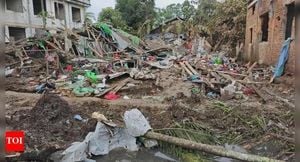The global fight against plastic pollution is taking center stage as leaders from over 170 countries gather for the fifth Intergovernmental Negotiation Committee (INC-5) discussions, which kicked off on November 25, 2024, in Busan, South Korea. This gathering aims to establish the world’s first legally binding treaty focused on comprehensively tackling the issue of plastics—a crisis long recognized as one of the planet's most pressing environmental challenges.
According to the United Nations Environment Programme (UNEP), the world produces around 460 million tonnes of plastic each year, with much of it discarded shortly after use. UN Secretary-General António Guterres emphasized the urgency of the situation, stating, “Our world is drowning in plastic pollution. By 2050, there could be more plastic than fish in the ocean.”
Discussing the threat posed by microplastics, Guterres noted their alarming presence within human bloodstreams, potentially leading to unknown health risks. This underlines why the treaty, viewed as ‘essential’ by many, is on the minds of officials and activists alike as the delegation convenes for what could be a historic agreement.
Despite the challenges, there is cautious optimism among many who hope for significant progress during this week-long meeting. UNEP Executive Director, "Not a single person on the planet wants plastic washing up on their shores or plastic particles circulating..." Such sentiments resonate even beyond environmentalists, with numerous stakeholders signaling their desire for actionable items on the negotiation table.
Broad support for the treaty is evident, with South Korean President Yoon Suk Yeol emphasizing the need for action to combat excessive plastic waste for future generations during his opening remarks. He urged member nations to unite and reach agreements pivotal for safeguarding the planet, stating, "I sincerely hope… to open a new historic chapter by finalizing a treaty on plastic pollution,”.
The negotiations come at the end of two years of intense discussions aimed at creating legally binding global regulations aimed at not only reducing plastic pollution but also mitigating its harmful environmental impacts. The INC-5 meetings are not merely administrative; they follow four previous sessions and mark precisely 1,000 days since talks began back in Uruguay.
While there’s broad agreement on the need for international action to curb plastic pollution, key sticking points remain. For example, delegates are wrestling with contentious issues of production limits. Many, led by countries like Norway and Rwanda, argue for stringent reductions on both the production and consumption of plastic, especially single-use items. Conversely, significant oil-producing countries, such as Saudi Arabia and Russia, have expressed reservations about binding mandates and have instead called for voluntary targets.
This division touches on the crux of the discussions—whether the treaty will advocate for globally unified standards or allow nations to opt for self-determined goals, possibly diluting the effectiveness of the treaty. The Saudi delegation cautioned against "imposing rigid and exclusionary policies to address complex global issues,” arguing for flexibility to balance environmental protection with socio-economic development.
Another layer to the negotiations is the financial aspect. Delegates from developing countries have voiced concerns about the resources required to implement the measures stipulated by the treaty. "Compliance must be linked to provision of the incremental cost," insisted India’s representative, highlighting the need for developed nations to share the financial burden, considering they have benefitted most from industrial activities related to plastic production.
Environmental activists have not remained silent during this process. Prior to the talks, hundreds gathered in Busan to demand decisive action against plastic pollution. Many carried banners proclaiming slogans such as "Cut plastic production" and "Drastic plastic reduction now!" The public demonstration was organized by various grassroots organizations, including Greenpeace, to amplify voices calling for commitments to reduce plastic waste at the source.
During the rally, participants illustrated their connection to the issue through elaborate costumes and displays made from recycled materials, all aiming to communicate the urgency of the fight against plastic pollution. Activist Graham Forbes of Greenpeace noted, "We are here… to represent millions of people demanding world leaders address plastic pollution by reducing the amount of plastic we produce."
The plastics industry, too, is seeking to influence the direction of the treaty discussions. Representatives are advocating for strategies focused on innovatively redesigning plastic products to promote reuse and recycling—approaches they believe will effectively curb pollution without undermining the utility of plastic materials. Industry leaders argue for practical solutions rather than restrictions.
One significant point of contention is around chemical measures of concern, where there are calls to establish global criteria to phase out harmful chemicals associated with plastic products. Yet pushback from some countries and the chemical industry suggests hesitance to adopt rigid frameworks, emphasizing the need for existing protocols and national regulations to be prioritized instead.
With strong motivations coming from both the environmental advocacy community and the private sector, the pressure is mounting on negotiators to establish binding agreements. The stakes have never been higher, with continued delays threatening not just marine ecosystems but human health as well.
The final tone leading up to agreement will hinge significantly on the ability of negotiators to strike compromises amid the diverse interests at play. The upcoming days of negotiation may well shape the global approach to one of the most concerning environmental challenges, with all eyes on Busan as this pivotal moment continues to evolve.
Every day brings the urgency of plastic pollution closer to home for millions around the world. Beyond treaty discussions, activists, citizens, and nations must acknowledge their significant role within the framework of sustainable practices and strive diligently toward resolutions.



